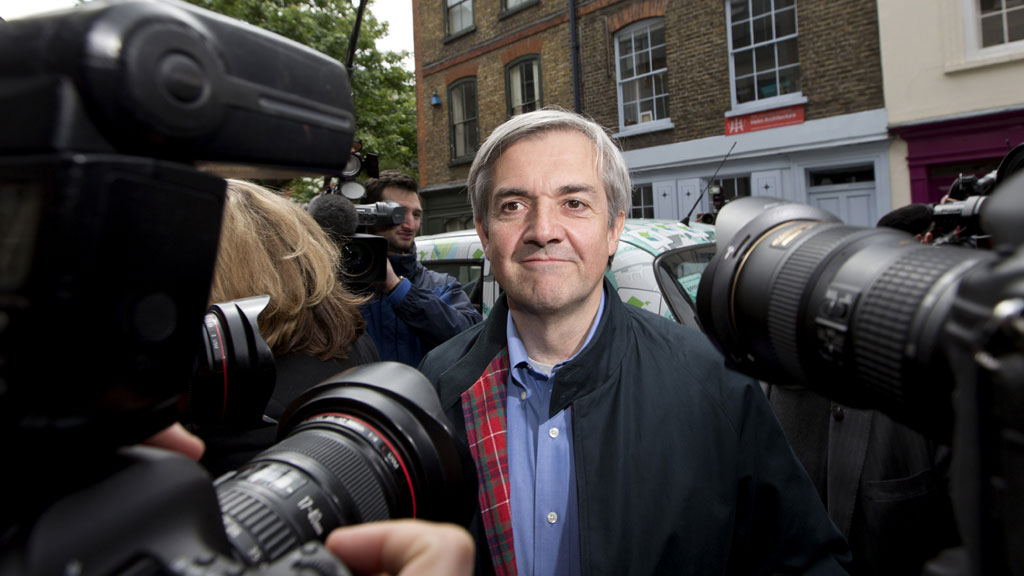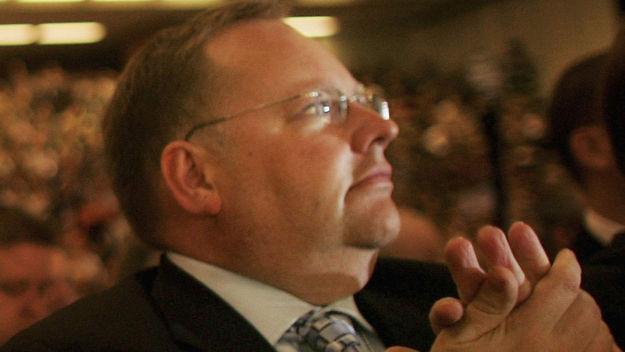The strange death of Liberal Democrat Britain?
He was the fresh-faced politician on the block in 2010. But with the Rennard row showing no signs of easing, Nick Clegg looks weary and his party is in the doldrums. So what next for the Lib Dems?

It seems a lifetime ago. In the last few weeks of the 2010 election campaign, the Liberal Democrats managed to out-poll Labour on several occasions, achieving a rating of 34 per cent in one YouGov survey, putting them ahead of Labour and the Conservatives.
This was at the height of “Cleggmania”, when leader Nick Clegg rose to prominence after impressing in the party leaders’ televised debates.
The now deputy prime minister won plaudits for his performances and was riding high in the polls, with better showings than David Cameron and Gordon Brown.
YouGov polling for the Sunday Times found that he was viewed as the most impressive, honest and charismatic of the three and the strongest leader.
With it looking as though no single party would win an overall majority, 53 per cent said a hung parliament with the Lib Dems holding the balance of power could be a good thing (37 per cent disagreed).
The campaign could not have gone better for Mr Clegg and his party, but reality dawned as soon as the results were counted. There was no breakthrough: they had won 57 seats and 23 per cent of the popular vote (compared with 62 seats and 23 per cent in 2005, when Charles Kennedy was leading the party).
Despite this, David Cameron’s Conservatives failed to win a majority and he turned to Mr Clegg for support – with Britain entering the unfamililar territory of coalition, two-party government.
Falling poll ratings
Back then, the Lib Dems were polling 21 per cent in YouGov surveys, but by November 2010 this had fallen to 9 per cent and has not risen above 13 per cent since then. The party’s ratings are often in single figures, consistently behind Ukip since August 2013.
Now “the pollster’s pollster” Bob Worcester is predicting they’ll only win 24 seats at the 2015 election.
Some Lib Dem voters will never forgive the party for forging a coalition with the Tories. Others who abandoned Labour for the Lib Dems – in protest at the Iraq war and tuition fees – are unlikely to do so again.
Then there is the issue of political identification, with Lib Dem voters far less likely to say they identify with their party than Labour and Conservative supporters. This is because the Lib Dems tend to benefit from protest and tactical votes.
Anthony Wells, associate director of political and social research at YouGov, told Channel 4 News the Lib Dems had “lost several of their previous USPs”.
They used to be “an alternative anti-Conservative vote” for people who did not like Labour, but after being in coalition with the Tories, they had lost the “anti-Tory vote”.
He added: “They also used to benefit from a ‘plague on both your houses’ protest vote. They were the natural party for people who just wanted change from the current establishment. Again, being part of government makes it difficult to appeal in that way, so they’ve lost the anti-establishment vote.”
Mr Wells described Mr Clegg’s ratings as “dire”. So what has gone wrong for the Lib Dems and their leader since 2010?
Tuition fees
Mr Clegg’s first big test was university tuition fees, introduced by the previous Labour government. During the election campaign, he said his party would vote against any increase, winning support from students in the process. But he ended up supporting the coalition’s decision to raise fees from £3,300 to £9,000 a year.
All very embarrassing for Mr Clegg, who apologised in a party political broadcast and admitted that the Lib Dems had been wrong to make the pledge.
This broadcast was remixed by a music producer and became a hit on YouTube, with Mr Clegg’s words turned into song. The effect was to gently poke fun at Mr Clegg’s apology, but the Lib Dem leader took it in good grace, allowing the producer to turn it into a single to raise money for charity.

Chris Huhne
Worse was to come in May 2011, when the then energy secretary Chris Huhne – who stood against Mr Clegg for the Lib Dem leadership in 2007 – was accused of dodging a driving ban by asking his then wife, Vicky Pryce, to accept his penalty points for speeding.
He resigned his cabinet post when he was charged in February 2012, but continued to deny the allegations until the first day of his trial a year later, when he admitted perverting the course of justice and said he was resigning as an MP.
A month earlier, Mr Clegg had said he hoped Mr Huhne would return to the “top table” of British politics if he was cleared of the charges against him.
The episode, which culminated in Mr Huhne and Ms Pryce being jailed, was another testing time for the Lib Dem leader. But the end result could have been worse: the Lib Dems managed to hold on to Mr Huhne’s Eastleigh seat in a by-election.

Lord Rennard
The Lord Rennard affair has been covered in depth on this website, so a brief resume will have to do on this occasion.
In February 2013, Channel 4 News broadcast allegations that the former Lib Dem chief executive had behaved inappropriately towards female members of the party and a police investigation began.
Seven months later, the police announced there was insufficient evidence to support a prosecution.
In January 2014, a report for the Lib Dems by Alistair Webster QC found that the evidence against Lord Rennard was not sufficient to meet the burden of proof required by the party’s disciplinary procedures, but he advised the peer to apologise to the women involved for violating their “personal space”.
Lord Rennard has refused to do so for legal reasons. He continues to deny the allegations and was ready to take his seat in the Lords on Monday when it was announced that he had been suspended from the party while a new investigation begins into whether his failure to apologise has brought the party into disrepute.
This decision was taken by a Lib Dem committee which oversees disciplinary procedures, not Mr Clegg, and the peer is now considering taking legal action against the party.
Asked why he had failed to extract an apology from Lord Rennard, Mr Clegg said: “I don’t think it is my job as leader of the party to try to micro-manage this …. I can’t frogmarch someone to apologise.”
Whether this long-running saga has any effect on Lib Dem hopes in 2015 remains to be seen, but it is clearly a test of Mr Clegg’s leadership, even if internal party rules make it difficult for him to bring it to a swift end.
In February 2013, after Channel 4 News had first broadcast the allegations, YouGov polling for the Sun showed that Mr Clegg had his work cut out.
Asked if Mr Clegg had been open and honest about way he handled allegations, 11 per cent of respondents said yes and 52 per cent no. Some 28 per cent said the way the party had dealt with the issue made them view the Lib Dems more negatively; 2 per cent more positively.
Anthony Wells told Channel 4 News: “What makes me worry a bit more is that it’s not going away. Generally speaking this should be a Westminster bubble story – it’s about a disciplinary procedure against a backroom figure most of the public have never heard of.
“In normal terms it should be the sort of thing that only the most politically minded notice and which is rapidly forgotten by next week. By not dealing with it cleanly it becomes a bigger story, sticks around longer, and stands more chance of being noticed by floating voters.”
With an election in 2015 and his party languishing in the polls, Mr Clegg will be hoping a solution is found soon.
Achievements in government
There is a debate over how much the Lib Dems have achieved in government and to what extent, as junior partners, they have been forced to accept Conservative policies many party activists find hard to stomach.
The leadership claims credit for lifting 2.7 million of the poorest workers out of income tax, taking action on poverty through the pupil premium, providing the poorest young children with free school meal and childcare, and raising the state pension.
In September 2013, YouGov polling for the Sun found that voters were not convinced the Lib Dems had achieved much, while trust in the party had fallen and Nick Clegg was considered indecisive by 55 per cent (decisive 18 per cent) and weak by 75 per cent (strong 11 per cent).
But if the Lib Dems are having no effect on coalition policy, why are the newspapers full of Conservative MPs bemoaning their influence and urging David Cameron to get a grip and return to the true Conservative path?
The problem for Mr Clegg is that he has a lot of convincing to do, but is running out of time. Having to contend with long-running internal issues is not helping.
Then there is the fact that his greatest hope of making the Lib Dems a power to be reckoned with was a change to a more proportional voting system.
A referendum was agreed between the Lib Dems and Conservatives as part of the coalition deal after the election, but the voters overwhelmingly rejected replacing first past the post with the alternative vote in 2011.
-
Latest news
-
Laughing Boy: New play tells the tragic tale of Connor Sparrowhawk5m

-
Sewage warning system allows some of worst test results to be left off rating system, analysis shows3m

-
Post Office inquiry: Former CEO didn’t like word “bugs” to refer to faulty IT system4m

-
Israeli soldier speaks out on war in Gaza12m

-
PM’s defence spending boost should be ‘celebrated’, says former Armed Forces Minister4m

-




